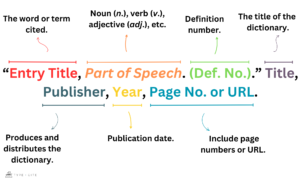How to Cite a Dictionary Entry in MLA
- Written by Tomas Elliott (Ph.D.)
- Published on 05/09/2024
In academic writing, accurately citing your sources is crucial for giving credit to the original authors and avoiding plagiarism. When referencing a dictionary entry in MLA style, it’s important to follow specific guidelines to ensure clarity and consistency. This article provides a step by step guide on how to cite a dictionary entry in MLA format.
CITATION ELEMENTS OF A DICTIONARY ENTRY
- Entry Title: The title of entry refers to the specific word or term that is being referenced within the text. It serves as the primary focus of the citation and should be accurately identified to ensure clarity and precision in the citation.
- Part of Speech and Definition Number: When a word has multiple meanings or serves various parts of speech, clarity is essential. By abbreviating the part of speech in italics, such as n. for noun or v. for verb, and specifying the corresponding definition number (not in italics), ambiguity is avoided. For example, the word “run” may denote both a verb and a noun, each with distinct definitions. Including the part of speech and definition number ensures precision in the citation.
- Dictionary Title: The title of the dictionary, representing the reference work from which the entry originates, should be italicized. This could be a renowned dictionary such as Merriam-Webster, Oxford English Dictionary, or any other authoritative source relevant to the subject matter.
- Publisher and Publication Date: The publisher and publication date provide essential information about the source’s origin and credibility. The publisher is the entity responsible for producing and distributing the dictionary, while the publication date signifies the year when the dictionary was published. This information adds credibility to the citation and assists readers in verifying the authenticity of the source.
- Page Number or URL: Including page numbers or URL is important for making it easy to find the entry you’re referencing. If you’re using a printed dictionary, the page number shows exactly where the entry is in the book. But if you’re using an online dictionary, the URL takes you right to the website where you can see the entry. Having page numbers or URL makes it clear where the information comes from, which helps make your research more trustworthy.
 |
Identify Part of Speech Abbreviations: Learn to recognize part of speech abbreviations like noun (n.), verb (v.), adjective (adj.), etc., which provide insight into how the word functions grammatically within a sentence, aiding comprehension. Refer to Specific Definition Numbers: Pay attention to the definition number, such as (1), (2), etc., accompanying each definition, allowing for precise identification of the intended meaning of the word within the dictionary entry, enhancing accuracy in usage and citation. Use Title Case for Dictionary and Entry Titles: Apply Title Case to both the title of the dictionary and individual entry titles. Capitalize principal words, including nouns, pronouns, verbs, adjectives, and adverbs. |
EXAMPLE CITATION FOR A DICTIONARY ENTRY
With Parts of Speech and Definition Number
| Citation |
“Internet, N. (3).” Collins English Dictionary, HarperCollins Publishers, 2024, www.collinsdictionary.com/eng/internet.
|
| Structure |
“Entry Title, Part of Speech. (Def. No.).” Dictionary Title, Publisher, Year, URL.
|
Without Parts of Speech and Definition Number
| Citation |
“Apple.” Collins English Dictionary, 4th ed., vol. 2, HarperCollins Publishers, 2024, p. 34.
|
| Structure |
“Entry Title.” Dictionary Title, Edition, Volume, Publisher, Year, Page Number.
|
EXAMPLE IN-TEXT CITATION FOR A DICTIONARY ENTRY
With Parts of Speech and Definition Number
| Example | (“Internet,” def. A.3) |
| Structure | (“Title of Entry,” def. definition number) |
Incorporate a parenthetical citation comprising both the term and its corresponding definition number.
Without Parts of Speech and Definition Number
| Example | (“Apple”) |
| Structure | (“Entry Title”) |
GIVE YOUR CITATIONS A BOOST TODAY
Start your TypeCite Boost 3 day free trial today. Then just $4.99 per month to save your citations, organize in projects, and much more.
SIGN UP